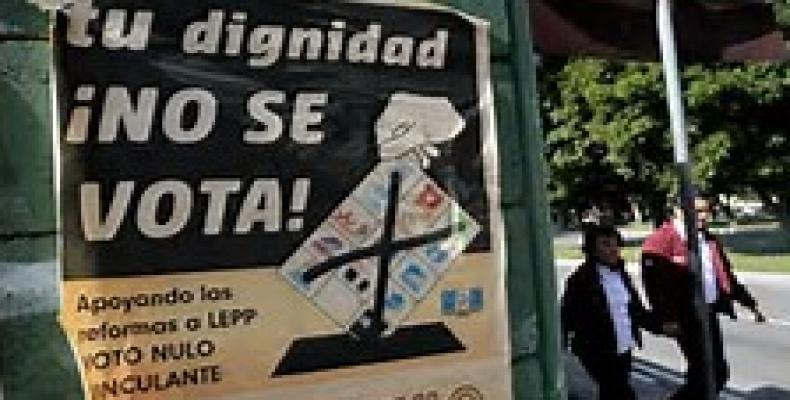Supreme Electoral Tribunal in Guatemala called for general elections officially on May 2, 2015. Ahead of the election, the La Linea corruption case involving high-ranking officials of the outgoing administration, including President Otto Pérez Molina and Vice President Roxana Baldetti, was made public.
The Vice President resigned in May and was arrested on fraud charges in August. More than a dozen ministers and deputy ministers as well as a number of government officials also resigned. Less than a week before the election, President Pérez was also stripped of his immunity, resigned and was arrested.
Alejandro Maldonado Aguirre acts as head of state until a new president is sworn into office.
On Sunday, October 25, voters will have to choose between a pallid right wing headed by of the former First Lady Sandra Torres, of the National Unity for Hope, and on the other hand Jimmy Morales, of the National Unity Movement, and puppet of a former military group which still dreams of full control of the nation’s society.
In the case of Sandra Torres, she already has had a taste of power when her husband, Alvaro Colom, headed a presidency that promised much but gave virtually nothing, especially to the most needy sectors of the Guatemalan society such as the indigenous peoples, with the highest indicators of disease, ignorance and malnutrition and poverty.
On his part, candidate Morales is benefiting from the corruption scandal that sent to prison President Otto Pèrez Molina and his wife, Roxana Baldetti.
As a new face in the Guatemalan political scene, candidate Morales has grabbed the intention to vote from tens of thousands of indignant Guatemalan voters over prevailing corruption and open graft, which also extends to the congressional ranks.
Morales came out the winner in the first round of the Presidential voting, but with less than the 51% of the total votes as required by by Guatemalan electoral law.
What many voters distrust about Morales is the support given to his candidacy by former high Guatemalan Army officers, regarded by many in as the sector that has traditionally fostered crime and repression, not to speak of its opposition to the peace accords that put an end to the brutal domestic conflict and its tens of thousands of victims.
This military sector has been blamed for the genocidal policies applied against the native population, and they promptly label as “terrorist” any citizen who rejects military solutions and they regard as dangerous any social, student or trade union movement.
It most certainly will be a very complex election, since the options are to return to that which Guatemala already had: a corrupt, useless government, as that headed by President Alvaro Colom from 2008 to 2012 or to a repressive administration, which would violate the most basic human rights, as that proposed by the former military.
It is, most certainly, a very complex situation for the Guatemalan voters, who face two different programs that refuse to solve the real, tragic problems facing Guatemalan society.
It is no surprise that there is a general call for Guatemalans to wear black for mourning when they turn out on Sunday.


